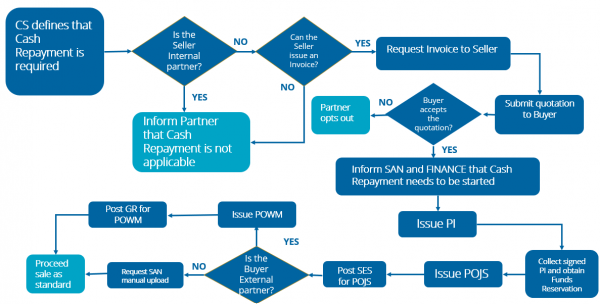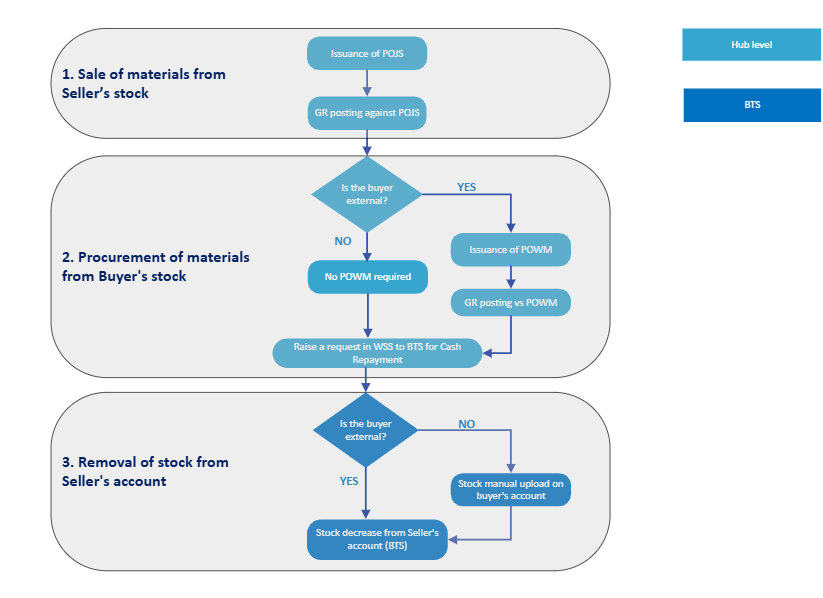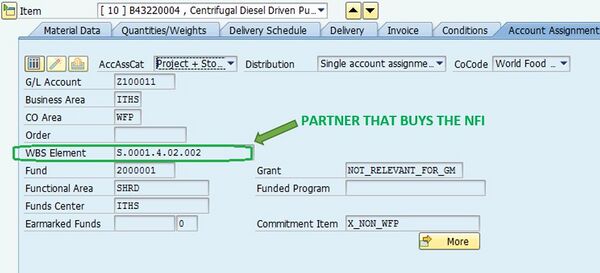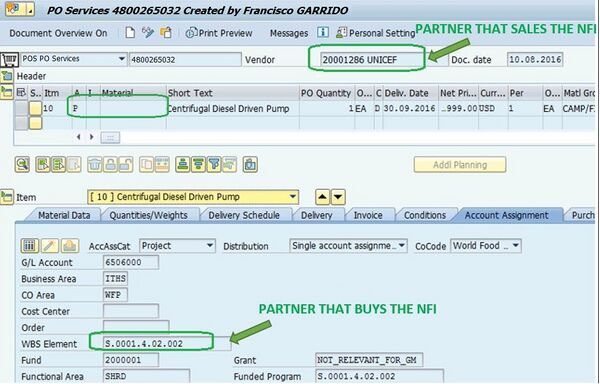3.3.2 Sales Order with Cash Repayment
Cash repayment process
UNHRD Sales process includes the sales of items between Partners. As per the Memo from UNHRD Network Coordinator (Memorandum for Cash Repayment.pdf) this process can be applied to sale of items stored by UNHRD on behalf of External Partners and can't be applied to WFP stocks.
This process is usually applied when an External Partner requires the cash repayment of the items requested by another Partner, either internal or external, rather than approving the loan of same items. In case loan is not accepted, as a last resort, UNHRD can assist in purchasing stock from other partners. Cash Repayment should not be proposed and should be adopted ONLY as a last option. Customer Service has to ensure that the regular Loans and Borrowing process is utilized as much as possible, which is strategic for UNHRD. Cash repayment should not be considered an alternative method to close an open loan. Instead, its purpose is to make items available to a requestor who, in this case, purchases the items from another partner willing to sell them, rather than providing them on loan. Cash Repayment process should not be offered and can be applied only if the partner willing to sell the items is in the position to issue an Invoice or a Debit Note to receive the payment of the items sold to other UNHRD Partners.
Cash Repayment: definition and application
The Partner selling its items is identified as SELLER while the Partner requesting for these items is identified as BUYER. The Partner acting as Seller is treated as Vendor and is identified as such in the Cash Repayment process.
The below concepts must be considered to evaluate if Cash Repayment process is applicable or not:
- Only External Partners can act as Vendor in the Cash Repayment process.
- Items can be sold to either Internal or External Partners.
- UNHRD is not allowed to sell Inventory Stock recorded under WFP accounts.
- The business solution managing this process falls under standard UNHRD Sales procedure (i.e. 7% of MRC is applicable)
- Sales value is established by the External Partners acting as Vendors and mutually agreed by the two Partners, as specified in Chapter 5 of UNHRD SOP.
- The value of the goods sold must be in line with the invoice or debit note provided by the Partner acting as Seller.
NOTE Cash Repayment process is exclusively applicable if the External Partner acting as Seller is able to issue an Invoice or a Debit Note to be used for the settlement of the sale. Therefore, when UNHRD Customer Service assistant receives a request from an External Partner to apply the Cash Repayment process, he/she must ensure in advance that the Partner is clearly acquainted with the above requirement. Below flow chart summarizes both the steps to manage the Sales process for Cash Repayment and the steps to be performed in Warehouse Management:
How to apply Cash Repayment
The process is split in three phases:
- Procurement of materials to Buyer’s stock: this is completed at hub level (when buyer is an External Partner) or by Support Office (when buyer is Internal Partner) applying value of goods sold (i.e. Seller's Invoice value)
- Sale of materials from Seller’s stock: this is performed at hub level by the Support office, applying the value of goods sold (i.e. Seller's Invoice value). The payment to the seller is performed by Finance unit applying the same value which was mutually agreed by seller and buyer.
- Removal of stock from Seller's account: this is performed by Support Office through a manual decrease from the Seller's stock (i.e. MAP value)
Below flowchart summarizes the three phases listing the steps to be applied at Hub level and Support Office level. To be noted that the steps outlined must be performed in the exact sequence as shown in the flowchart:
1. Procurement of materials to Buyer’s stock:
In case the Buyer is an External Partner, this part of the process is managed at Hub level by creating a POWM to receive the items under the Partner's stock. The Vendor code associated to the Partners selling the NFI (the Seller) has to be picked from the list of WINGS Vendor Codes. In case the Partner does not have a Vendor Code associated in WINGS, the standard request to WFP Vendor Master for Warehouse Management purposes has to be submitted by UNHRD Focal Points for WFP Vendor Master issues. The value to be adopted has to match with value of Invoice provided by the seller. The remaining POWM specifications have to be entered as for any POWM created for the receipt in Warehouse Management for External Partners NFIs:
The WBS to be entered is the one of the BUYER:
This part of the process is completed by posting the GR versus the POWM. In case the Buyer is an Internal Partner, this part of the process is managed by WM experts at Support Office (BTS) by performing a manual upload (with Movement Type 561) adopting same material code and applying the value reported on the Invoice provided by the seller.
2. Sale of materials from Seller’s stock:
To perform the cash repayment against Seller's account, Customer Service representatives must first obtain the invoice from Seller. Only once the invoice has been received, Customer Service representatives issue a PO Service (i.e. POS type), applying Purchase Organization UNJS and the owned Purchasing group (e.g. AE9, IT9, GH9, etc.).
By doing this WINGS creates the so called POJS, which is a type of POs issued when the supplier is an UN Joint or Statutory - no-profit- entity. The vendor code to apply to the POJS has to be the one associated to the Seller and if it does not exist or if it is not extended to POJSs standard process for creation/extension of vendor code has to be followed. The POJS is completed by entering the lines that reflect the stock that the Seller agreed to sell to the Buyer: specifications for the line items are listed below:
- "P" as account assignment
- Item category to remain empty, so that a GR will be posted to start payment for Seller
- Material codes to be entered to reflect the items that are meant to be sold to Buyer
- Net value to reflect the value of sell mutually agreed by the Partners (i.e., in line with invoice provided by the Seller)
- Remaining specifications to reflect standard data entry
- Copy of the invoice issued by the Seller to be attached for internal references.
- POJSs must be released by Network Coordinator (NC) as last approving level. This is because POJSs have their own Purchase Organization code, i.e. UNJS, and thereof the release strategy falls under Corporate structure that foresees CD as second level of approval: in this case, being NC's approval equivalent to CD`s, second approval on POJS posted by UNHRD falls under Network Coordinator authority.
- GR to be posted by logistics staff
- Payment to seller starts after GR posting
- Logistics Staff post the GR versus the POJS
- The process is completed by UNHRD Finance by performing the payment versus the POS and GR created
3. Removal of stock from Seller's account
To complete the Cash Repayment process, once the GR is posted against the POJS to pay the Seller and once the items have been made available under Buyer's account (either through the POWM/GR issued at hub level or through manual upload performed by Support office), the stock sold to the Buyer is removed from Seller's account by a manual decrease posted by Support Office applying MAP value. Thereof, the WM Experts at Support Office upon receipt of confirmation for sale (i.e., GRs posted) perform the stock decrease from Sellers's balances, by applying a specific Movement Type - i.e. 567 - dedicated to Cash Repayment process. The value of decrease from Seller stock reflects the actual MAP value:
Cash Repayment vs Loans & Borrowing
xxxxxxxxxxxxx






